PHILOSOPHICAL APPROACHES TO ENSURING THE COMFORT OF TOURISTS
Abstract
The article analyzes the concept of "comfort" and distinguishes its various types. Based on philosophical foundations for studying human nature, it examines the components that shape a tourist's personality and influence their demands for different types of comfort. It emphasizes that comfort depends on the location where the person (tourist) is, as well as the fulfillment of certain needs: material, emotional, and social. From a philosophical point of view, the article analyzes the formation of individual traits in a person (tourist), which affect their attitude toward the surrounding space and their behavior in society, and how this impacts the provision of comfort. Through the lens of philosophical categories, the tourist is seen as both a biological being and an individual with inherent characteristics, existing (moving) in a certain space (natural, social) and shaped by a multitude of real-world factors. On tourist trips, you may meet people of different types with different worldview values, aesthetic tastes, and cultural levels. Emotional discomfort and even conflicts may arise based on their mismatch under the influence of irrational emotions and instincts. If residents of the same hotel; visitors of the same restaurant; members of the same tour group; tourists vacationing in the same destination are representatives of hostile communities, there is also a risk of acute conflicts. Socioeconomic differences, which depend on the type of occupation, level of position, attitude to work, and propensity for fraud, can cause rejection and even lead to conflicts. It can be argued that the solution to the problem of tourist comfort is based on a deep understanding of the essence of a person, the conditions that influence the formation of his or her personality and the emergence of needs of a certain level. The above considerations are important for both tourism professionals and potential tourists.
References
Туристичний барометр UNWTO URL: https://en.unwto-ap.org/resources/worldtourismbarometer-january-2024/
A Theory of Human Motivation A. H. Maslow (1943) URL: http://psycnet. apa.org/record/1943-03751-001
Bauman Z. Praca, konsumpcjonizm i nowi ubodzy. Тłum. S. Obirek. Kraków: WAM, 2006. 212 s.
Щерба О. І. Суспільство споживання та консюмеризм – нові тенденції та виклики для України // Актуальні проблеми філософії та соціології: Науково-практичний журнал; Національний університет «Одеська юридична академія». Одеса, 2021. Вип. 29. С. 85-92.
Пазенок В. С. Філософія: навч. посіб. К.: Академвидав, 2008. 280 с.
Скляр Г.П. Генезис постнекласичного прикладного туристичного знання: онтологічні виклики практичного розуму. Науковий вісник Полтавського університету економіки і торгівлі. Серія «Економічні науки» №1(86). 2018. C.49 – 55.
Гаврилюк А. М. Державне управління сферою туризму в Україні в умовах глобалізації: аксіологічний підхід. Інвестиції: практика та досвід. № 4, 2018. С. 119 – 123.
Пушкар З. Соціально-психологічний клімат у колективі та чинники, що впливають на його формування / З. Пушкар, Г. Войтович. Українська наука: минуле, сучасне, майбутнє. – 2013. – Вип. 18. С. 133–143.
Дуцяк І. З. Антропологічні аспекти філософії туризму. Актуальні проблеми філософії та соціології. № 42, Одеса: Видавничий дім «Гельветика», 2023. С. 27–32.
Turystychnyi barometr UNWTO Available at: https://en.unwto-ap.org/resources/worldtourismbarometer-january-2024/ (accessed September
, 2024).
A Theory of Human Motivation A. H. Maslow (1943) Available at: http://psycnet. apa.org/record/1943-03751-001/ (accessed September 12, 2024 2024).
Bauman Z. (2006) Praca, konsumpcjonizm i nowi ubodzy [Praca, konsumpcjonizm i nowi ubodzy]. Tłum. S. Obirek. Krakоw: WAM, 212 р.
Shcherba (2021) O. I. Suspilstvo spozhyvannia ta konsiumeryzm – novi tendentsii ta vyklyky dlia Ukrainy [Consumer society and consumerism are new trends and challenges for Ukraine]. Aktualni problemy filosofii ta sotsiolohii: Naukovo-praktychnyi zhurnal; Natsionalnyi universytet «Odeska yurydychna akademiia». Vyp. 29. pp. 85-92.
Pazenok V. S. (2008) Filosofiia: navch. posib. [Philosophy: education. manual] K.: Akademvydav, 280 p.
Skliar H.P. (2018) Henezys postneklasychnoho prykladnoho turystychnoho znannia: ontolohichni vyklyky praktychnoho rozumu [Genesis of post-nonclassical applied tourism knowledge: ontological challenges of practical reason]. Naukovyi visnyk Poltavskoho universytetu ekonomiky i torhivli, Seriia «Ekonomichni nauky», no1(86), pp.49 – 55.
Havryliuk A. M. (2018) Derzhavne upravlinnia sferoiu turyzmu v Ukraini v umovakh hlobalizatsii: aksiolohichnyi pidkhid [Public Administration of the Tourism Sector in Ukraine in the Context of Globalization: An Axiological Approach]. Investytsii: praktyka ta dosvid, no 4, pp. 119 – 123.
Pushkar Z., H. Voitovych (2013). Sotsialno-psykholohichnyi klimat u kolektyvi ta chynnyky, shcho vplyvaiut na yoho formuvannia [Social and psychological climate in the team and factors influencing its formation]. Ukrainska nauka: mynule, suchasne, maibutnie, Vyp. 18, pp. 133–143.
Dutsiak I. Z. (2023). Antropolohichni aspekty filosofii turyzmu. [Anthropological aspects of the philosophy of tourism] Aktualni problemy filosofii ta sotsiolohii, no.42, Odesa: Vydavnychyi dim «Helvetyka», pp. 27–32.


